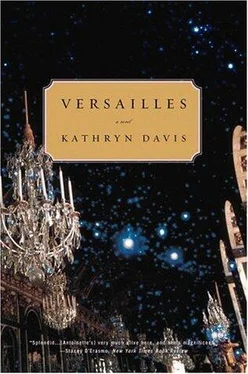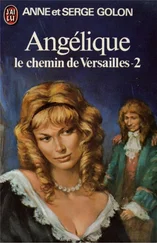Kathryn Davis - Versailles
Здесь есть возможность читать онлайн «Kathryn Davis - Versailles» весь текст электронной книги совершенно бесплатно (целиком полную версию без сокращений). В некоторых случаях можно слушать аудио, скачать через торрент в формате fb2 и присутствует краткое содержание. Год выпуска: 2003, Издательство: Back Bay Books, Жанр: Историческая проза, на английском языке. Описание произведения, (предисловие) а так же отзывы посетителей доступны на портале библиотеки ЛибКат.
- Название:Versailles
- Автор:
- Издательство:Back Bay Books
- Жанр:
- Год:2003
- ISBN:нет данных
- Рейтинг книги:4 / 5. Голосов: 1
-
Избранное:Добавить в избранное
- Отзывы:
-
Ваша оценка:
- 80
- 1
- 2
- 3
- 4
- 5
Versailles: краткое содержание, описание и аннотация
Предлагаем к чтению аннотацию, описание, краткое содержание или предисловие (зависит от того, что написал сам автор книги «Versailles»). Если вы не нашли необходимую информацию о книге — напишите в комментариях, мы постараемся отыскать её.
Versailles — читать онлайн бесплатно полную книгу (весь текст) целиком
Ниже представлен текст книги, разбитый по страницам. Система сохранения места последней прочитанной страницы, позволяет с удобством читать онлайн бесплатно книгу «Versailles», без необходимости каждый раз заново искать на чём Вы остановились. Поставьте закладку, и сможете в любой момент перейти на страницу, на которой закончили чтение.
Интервал:
Закладка:
Almost from the beginning I knew that I wanted the book to be full of numbers. An odd desire, given my own antipathy to mathematics, but utterly compelling. This was due, in part I think, to my wish to convey, simultaneously, a sense of almost unimaginable limitlessness and almost unendurable limit: to show how Versailles was a world with so many windows and doors you could barely keep count of them, and yet, ultimately, you could keep count. I wanted to make it clear that the container, no matter how huge, how apparently infinite, always has limits; that's what makes it a container.
And at the same time I wanted the numbers to contribute to that crucial sense of time passing, footsteps tapping along an endless marble hallway, a ticking clock.
Naturally in my research I unearthed lots of numbers. Chiefly dates, but also amounts of things, miles from here to there. Six doctors in attendance when Louis XV was dying, five surgeons, and three apothecaries, and six times an hour they took turns taking his pulse, studying his tongue, and poking his stomach. Eleven miles from Paris to Versailles, from the Chaillot tollgate to the Place d'Armes. Six hundred forty-seven diamonds the size of robins' eggs in the necklace that spawned the Diamond Necklace Affair. Prisoner Number 280: Marie Antoinette de Lorraine d'Autriche.
I found lots of numbers, but in the end, it turned out that the numbers I needed most were not to be found in any of my books.
I'd completely avoided the idea of going back to Versailles, following that initial visit, that moment of inspiration. I didn't want the place as I was imagining it — not the Versailles I'd actually seen, but the Versailles that was by now so vivid in my imagination — to be supplanted by the real thing. This is a genuine danger. (Why Vladimir Nabokov always said he never wanted to return to Russia, even after it was possible to do so: because that way the landscape of his childhood would remain intact, pristine in his memory.)
But the closer I came to the end of the book, the more I knew I had to go back to Versailles. I had to go back if only to find out, among other things, how many steps it would take to get from one end of the Hall of Mirrors to the other.
At the time when this conviction hit me, I was lucky enough to be staying in Bellagio, Italy, at the Villa Serbelloni. The Rockefeller Foundation had invited my husband to be a fellow there, and amazingly enough, spouses were not only tolerated but welcomed. In order to make my arrangements to get from Bellagio to Versailles — a truly complicated journey involving several ferryboats, several trains, and several buses — I consulted with Gianna Celli, the remarkable woman who pretty much single-handedly oversaw all of the Villa's operations, including the gardens. Though to say that Gianna "oversaw the gardens' operations" is misleading — more often she was down on her hands and knees uprooting peonies or up on a rickety stepladder ruthlessly pruning back the wisteria. After giving me detailed travel instructions, Gianna led me into the Bellagio gardens where she showed me a shrub not yet in flower, though if it had been, she told me, the flowers would have been a deep purple-blue. She explained that it was called La Gloire de Versailles (the Glory of Versailles), and asked me to find out whether it actually came from the palace gardens.
So armed with my tasks like a character in a fairy tale I made my way, once again, to Versailles.
It was late March; the weather was awful. The French museum workers had been on strike for over a month, and though the strike was supposed to have ended the day before I arrived in Versailles, I ended up standing in the pouring rain with an increasingly angry and slowly diminishing crowd for two and a half hours, watching the museum workers sitting behind their desks in the warm cozy entrance hall, drinking coffee, laughing, pointedly ignoring us all. End runs were attempted; rumors abounded. One particular British tour group leader routinely banged his fists on the windows, but to no avail. The strike wasn't over. The strike was over but the palace wouldn't open until the next day. The strike was never going to be over. The strike was over but the museum workers were punishing us by opening the palace three hours later than usual. (This proved to be the actual explanation.)
I was greatly relieved, having planned to stay in town for only three days.
Of course, it was a wondrous thing to be suddenly transported into the actual physical world I'd been living in in my imagination for over two years. 1 also felt weirdly proprietary, almost as if it were at my behest that all these strangers were being let loose in my house. First I took the regular tour, the one that permitted me access to the Hall of Mirrors. Notebook in hand, head down, counting under my breath, I made my way from one end of the hall to the other. I got some strange looks, stranger still when I started counting panes of glass, chandeliers, mirrors, but I was in ecstasy. I felt like I was doing something almost unheard-of: that I was actually in a position to be able to take the physical measurements of a place of my own invention.
Eventually the rain stopped and I went outside.
The sky was so dark blue it was almost black; the clouds were enormous and stormy, but everything was clear as crystal — a perfect French sky. The sun was shining. I went to work.
I counted how many steps it took to get from the palace to the far end of the Grand Canal and back.
I counted how many white squares and how many black squares made up the floor of the Marble Court.
I counted how many doors there were, how many windows.
How many fountains (all of them still dormant, the displays occurring only on Sundays, and for a hefty admission price, to boot).
How many steps from the Place d'Armes to the front door.
It was extremely difficult to keep count, especially since I was often interrupted. Sometimes by museum personnel wondering if they could help me. Sometimes by other tourists wondering if I knew how to find something or other. Sometimes (well, twice) by really weird men hitting on me. I think the nature of my activity was particularly attractive to the weird. From time to time I remembered Gianna's request and kept my eyes peeled for the Gloire de Versailles, but since nothing was in bloom there either, and since there were no labels on any of the plants, and since everyone I asked gave me a blank look, I finally gave up.
I spent four days and three nights in Versailles, and on the very last day, just as I was about to head back to my hotel and pack up, I decided to take one last look out across the Grand Canal. It was a beautiful day, but for a moment I stood there shivering. I felt as if the ghost of Marie Antoinette had passed right through me.
And then I saw two young men wearing hip waders, standing just a little to my right. Tall young men with longish hair. Gawky and cute in that way of young French men. Gardeners, I thought. They must be gardeners, why else the boots? And so I approached them to ask Gianna's question.
"Gloire de Versailles?" one of them said. "You want to see the Gloire de Versailles?" and he looked meaningfully at his friend before suddenly taking off.
"He will show you Gloire de Versailles," the other young man said. "Come with me."
Does this sound sinister? I was mildly suspicious but, frankly, too curious to exercise caution. Besides, it wasn't as if the young man was dragging me off into the bushes, only down the steps and over to the left, though the truth is his friend had taken off in the opposite direction.
This is ridiculous, I thought, and just as I was about to turn and head back to where I'd come from, the young man nudged me with his elbow.
And then I saw it. I couldn't help but see. All of the fountains had been turned on. All of them, their water impossibly bright and glittering against the still deep-dark-blue French sky. The Glory of Versailles.
Читать дальшеИнтервал:
Закладка:
Похожие книги на «Versailles»
Представляем Вашему вниманию похожие книги на «Versailles» списком для выбора. Мы отобрали схожую по названию и смыслу литературу в надежде предоставить читателям больше вариантов отыскать новые, интересные, ещё непрочитанные произведения.
Обсуждение, отзывы о книге «Versailles» и просто собственные мнения читателей. Оставьте ваши комментарии, напишите, что Вы думаете о произведении, его смысле или главных героях. Укажите что конкретно понравилось, а что нет, и почему Вы так считаете.












